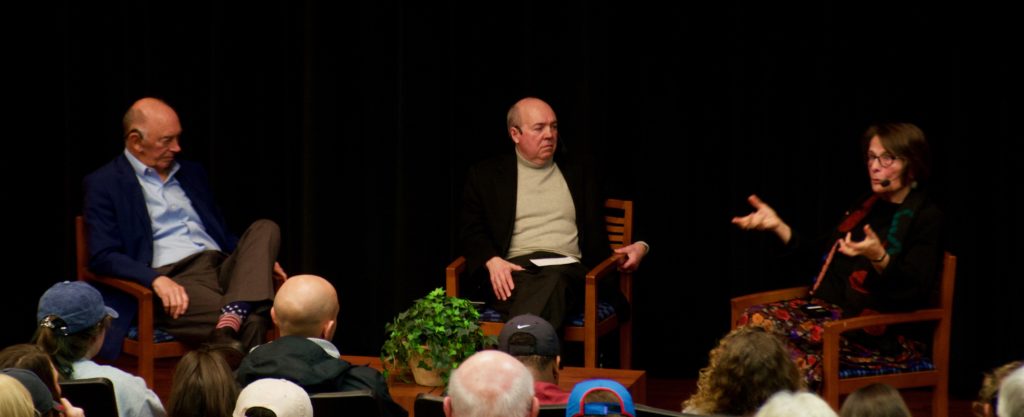
“We do have a crisis, and I bet most of us would agree that these two crises (journalism and democracy) are related” Overholser said. “There is no question that good journalism is good for democracy.”
In addition to her role at the Des Moines Register, which won a Pulitzer Prize for Public Service during her tenure, she was also the ombudsman for The Washington Post, a member of the editorial board for The New York Times and later, the director of the School of Journalism at the University of Southern California. She served as a board member for the Pulitzer Prize at Columbia University and now advises organizations like the Trust Project, Report for America and the Democracy Fund.
Overby Center Chairman Charles Overby and Overby Fellow Greg Brock joined Overholser at the event, which was part of the Overby Center’s spring lineup.
The crisis, Overholser said, is partly a result of what she calls “bothsideism,” which is essentially the efforts of major publications to present both sides of an issue. She claims that this comes at the expense of truth.
“’Bothsideism’ is one of the worst things going on in journalism today,” Overholser said. “It’s a false neutrality.”
President Trump has hurt journalism’s role in democracy not only because of his attacks on the media as “fake,” but because the media’s obsession with him has created a vacuum of news coverage, Overholser said. Because of the seemingly unending coverage of Trump, agencies like the Department of Agriculture, which she covered heavily at the Des Moines Register, have gone unchecked.
“President Trump is brilliant at manipulating the press,” Overholser said. “Of course (the media) has to report on the president, but we don’t have to report on every tweet.”
It is the media’s devotion to “bothsideism” in covering President Trump, according to Overholser, that has normalized his presidency and by this normalization, has harmed democracy.
“If you make Trump look like a normal president, you’re not giving people an accurate picture,” Overholser said.
In addition to coverage of the president, Overholser cited the decline of the local newspaper as a way in which journalism’s shortcomings are affecting democracy. She said that without local reporting, citizens are uniformed on decisions that affect their local governance.
“If you live in a community, and you’re no longer able to tell who is running for a given office or no one is paying attention to the school board, then you really are not able to make the same choices in your life (as someone who is informed),” Overholser said. “How do you be responsible if you don’t know what is happening?”
The missing presence of the community newspaper adds another wall between people and the news, Overholser said, because journalists at national media outlets do not care as much about individual people’s comments on their reporting.
“It’s one thing for (journalists) to be told things, and it’s another thing to listen,” Overholser said.
With so many media outlets reporting facts and information in divisive ways, Overholser said that consumers need to curate their own media diets to ensure that they are only consuming news from verifiable sources.
“You have to be your own editor,” Overholser said. “You need to take care of your own nutritional health; we now need to take care of our own information health.”
Overby Fellow Greg Brock, who also worked at The Washington Post and The New York Times, said that media elitism only contributes to problems of public trust. He recalled how outlets like The New York Times once claimed to be the sole gatekeepers of what was identified as news.
“There was a time when, if you asked the New York Times, ‘What is news?’ it was ‘Whatever we say it is,’ but it doesn’t work that way anymore,” Brock said.
The responsibility of getting journalism out of this crisis falls on individual consumers of media, Overholser said. She argued that readers must demand information that serves them, not other interests.
“If people want a good information system, they will end up with one,” Overholser said. “If they don’t give a damn, we won’t have it.”
Dr. Samir Husni, a journalism professor at Ole Miss, said after the event that he still believes in the need for both sides to be reported by mainstream media outlets and argued that no news provider should take a side politically, but agreed with Overholser that there is a need for improvement in journalism to fix democracy.
“Any media outlet has to spend enough time in due process to give both sides of the story,” Husni said. “When I was in journalism school, my professor said that when a journalist gives his or her opinion, he or she is no longer a journalist. We have to witness the rebirth of journalism if we are going to witness the rebirth of democracy.”
